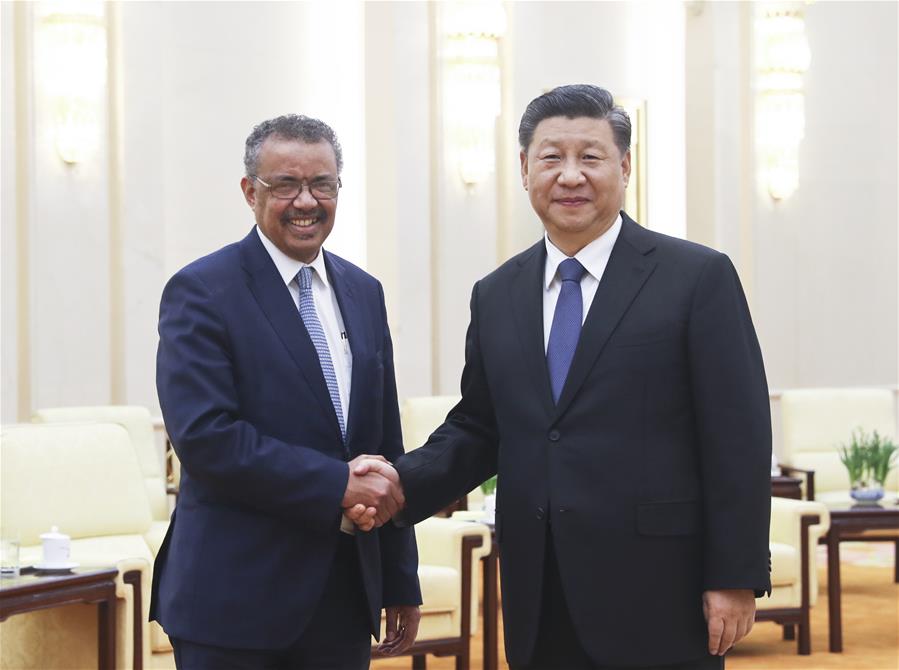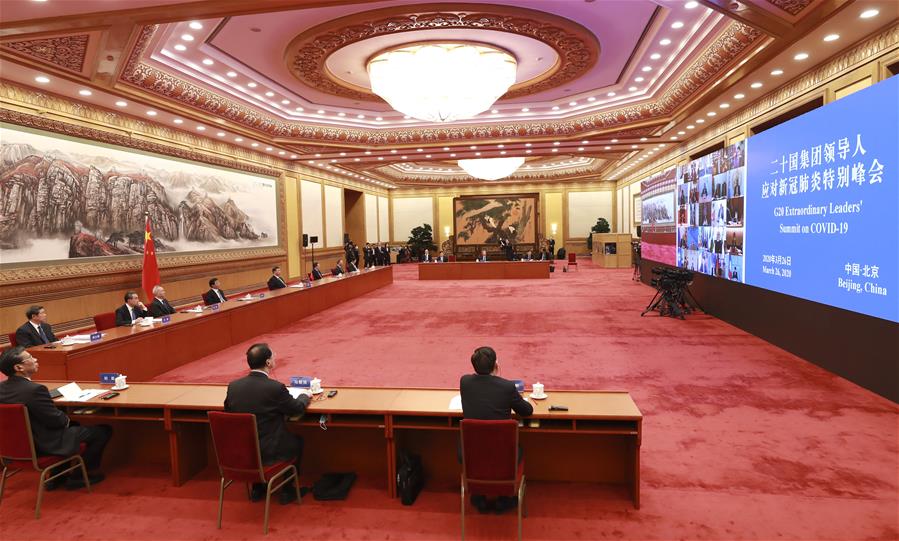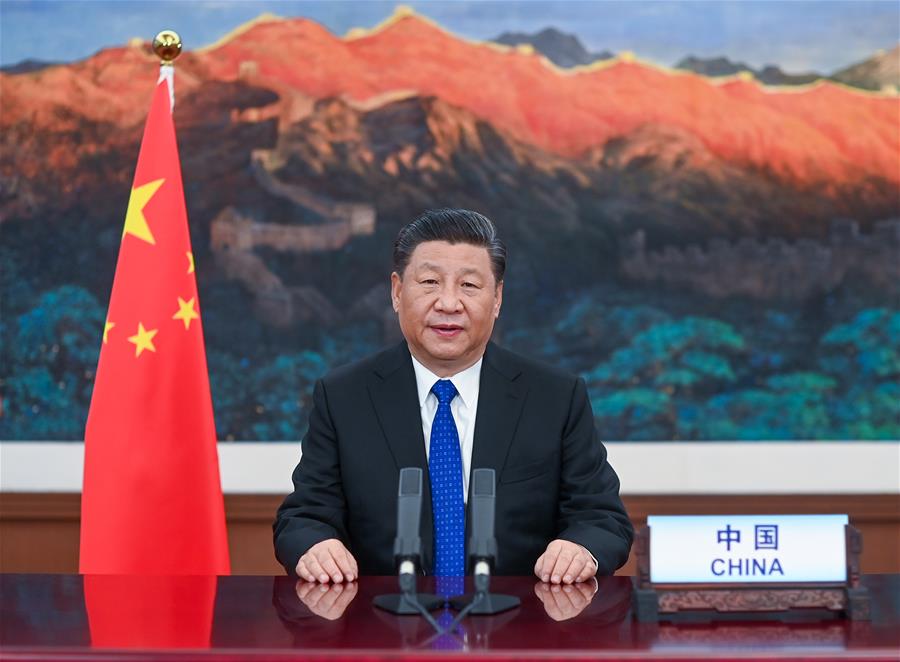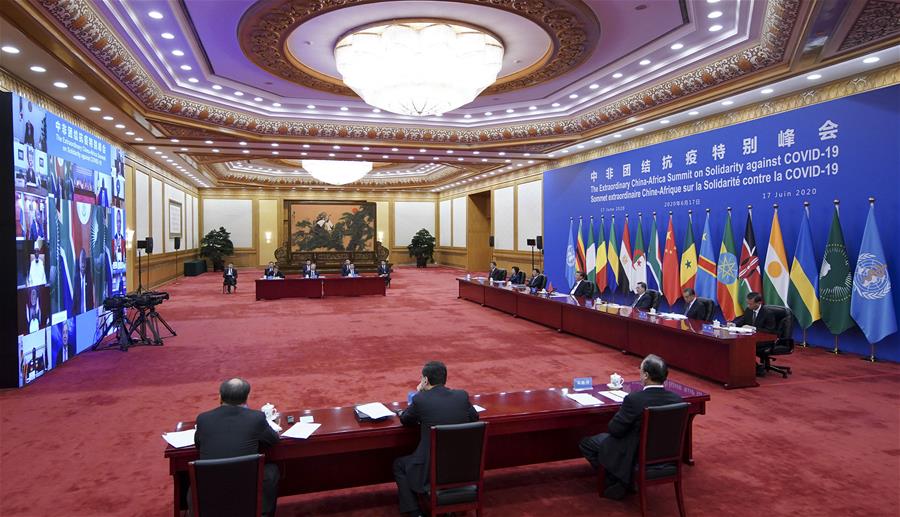Chronicle of Xi's leadership in China's war against coronavirus
Over the past seven-plus months, China -- the world's most populous nation -- has gone through an extraordinary time. More than 80,000 Chinese were infected by the virus and about 4,700 people lost their lives. Epidemic control became the country's top priority.
Global fight
The virus respects no borders. From a luxurious cruise ship docking in Japan to a ski resort in the French Alps, from Casablanca's ancient city to downtown Manhattan and the Amazon rainforest, the pandemic has spread all over the world.
By Sept. 6, global COVID-19 cases had exceeded 26 million in more than 210 countries and regions, leaving over 870,000 people dead, according to the WHO tally.
Xi said public health security is a common challenge for humanity, which requires joint efforts from all countries.
This is in the spirit of building a community with a shared future for humanity, a vision put forward by Xi in 2013. Over the past seven years, he has been promoting the vision on the international stage. Amid the global anti-virus fight, the importance of this vision has been made clear to all.
On Jan. 7, Chinese scientists isolated the first novel coronavirus strain. On Jan. 12, the WHO acknowledged receiving the coronavirus full genome sequence from China.
Tedros said China identified the pathogen in record time and shared the genetic sequence with the WHO and other countries. This bought invaluable time for other regions around the world to gear up their response.
Xi Jinping meets with visiting World Health Organization (WHO) Director-General Tedros Adhanom Ghebreyesus at the Great Hall of the People in Beijing, capital of China, Jan. 28, 2020. [Photo/Xinhua]
China also informed the United States of the outbreak in early January. A U.S. virus hunter came to China in late January to help battle the epidemic.
When China was bearing the full brunt of COVID-19's wrath, leaders of over 170 countries and 50 international and regional organizations expressed their support. A total of 77 countries and 12 international organizations provided assistance.
China fought the virus with openness and transparency as press conferences were held daily, sometimes several times a day, starting from Jan. 26.
Amid the epidemic, Xi met with Tedros, Cambodian Prime Minister Samdech Techo Hun Sen, Mongolian President Khaltmaa Battulga, and Pakistani President Arif Alvi in Beijing. Through video link, Xi met with European Council President Charles Michel and European Commission President Ursula von der Leyen.
Xi wrote back to Tedros and Bill Gates and exchanged letters with Argentine President Alberto Fernandez, Peruvian President Martin Vizcarra, Cambodian Prime Minister Samdech Techo Hun Sen and Mongolian Prime Minister Ukhnaa Khurelsukh.
Xi exchanged verbal messages with Kim Jong Un, chairman of the Workers' Party of Korea and chairman of the State Affairs Commission of the Democratic People's Republic of Korea. Xi sent a verbal message to Pakistani President Arif Alvi and exchanged messages with Bounnhang Vorachith, general secretary of the Lao People's Revolutionary Party Central Committee and president of Laos.
Xi also sent a congratulatory letter to the ninth ministerial meeting of the China-Arab States Cooperation Forum, urging efforts to advance cooperation in various fields including the pandemic response.
Since the start of the COVID-19 outbreak, Xi has conducted unprecedented "telephone diplomacy," having more than 60 phone conversations with over 50 foreign leaders.
These included those from Western countries such as British Prime Minister Boris Johnson and French President Emmanuel Macron; those from emerging-market countries -- Russian President Vladimir Putin and South African President Cyril Ramaphosa; and those from developing countries like Pakistani Prime Minister Imran Khan, Ethiopian Prime Minister Abiy Ahmed Ali and Cuban President Miguel Diaz-Canel.
In the talks, Xi said this global public health emergency has driven home the urgent need to build a community with a shared future for humanity. It is only by working together that countries around the world can overcome the pandemic, he said.
As the virus spread, some countries and regions were hit particularly hard. Xi sent messages to their leaders, expressing sympathy.
"Unity is strength;" "Building a community of health for all" -- these have been his messages to the world.
Xi Jinping delivers a speech titled "Working Together to Defeat the COVID-19 Outbreak" while attending the G20 Extraordinary Virtual Leaders' Summit on COVID-19 via video link in Beijing, capital of China, March 26, 2020. [Photo/Xinhua]
In late March, at an extraordinary G20 summit held via video link, Xi called for resolutely fighting an all-out global war against the COVID-19 outbreak, devising a collective response for control and treatment at the international level, supporting international organizations and enhancing international macroeconomic policy coordination to prevent a recession.
Kuhn, the U.S. scholar, said Xi's proposals to enable humanity as a whole to win the battle against this major infectious disease give meaning to the vision of an international community with a shared future.
COVID-19 has become the worst global public health incident since the end of World War II.
In May, at the World Health Assembly's opening held via video link, Xi mourned for every life lost to COVID-19 and expressed condolences to the bereaved families. He announced China's five measures to support the global COVID-19 fight.
Xi Jinping delivers a speech at the opening of the 73rd World Health Assembly via video link in Beijing, capital of China, May 18, 2020. [Photo/Xinhua]
Xi said China will make its COVID-19 vaccine a global public good when available, contributing to vaccine accessibility and affordability in developing countries.
In June, Xi chaired an extraordinary China-Africa summit on solidarity against COVID-19 via video conference and called for staying committed to fighting COVID-19 together, enhancing China-Africa cooperation, upholding multilateralism and taking China-Africa friendship forward.
"We oppose the politicization and stigmatization of COVID-19, and we oppose racial discrimination and ideological bias. We stand firm for equity and justice in the world," Xi said.
Xi Jinping chairs the Extraordinary China-Africa Summit on Solidarity against COVID-19 and delivers a keynote speech at the summit via video link in Beijing, capital of China, June 17, 2020. [Photo/Xinhua]
Whether it is taming the virus or achieving economic recovery, the world cannot succeed without solidarity, cooperation and multilateralism, Xi said in a message to a high-level video conference on Belt and Road international cooperation.
The right approach to tackling global crises and realizing long-term development is through greater connectivity, openness and inclusiveness. This is where Belt and Road international cooperation can make a big difference, he said.
At the start of the outbreak, China helped countries like the United States and Japan evacuate their nationals from Wuhan. As the pandemic spread, China donated funds to the WHO totaling 50 million U.S. dollars and sent 33 medical expert teams to 31 countries from late February to the end of August.
The Chinese government has sent much-needed medical supplies to over 150 countries and international organizations and facilitated foreign procurement in China. Non-governmental organizations and companies also gave a helping hand.
Hassan Ahmadian, assistant professor of Middle East and North Africa studies at the University of Tehran, said China's donations and exchange of expertise with affected countries, including Iran, stand out not only as a humanitarian gesture but also as responsible behavior on the part of a major country.
China has shared technical documents on treatment protocols and containment strategies with 180 countries and over 10 international and regional organizations. Beginning in March, Chinese experts held almost daily video conferences with their foreign peers. China's pioneering use of makeshift hospitals has also been adopted around the world, including in New York's iconic Central Park.
Xi had four phone calls with Putin in as many months. Putin said by providing timely assistance to other countries affected by COVID-19, China has set an example for the international community and responded, loud and clear, to the provocation and stigmatization by some country. Putin also said Russia will stand firmly by China's side.





